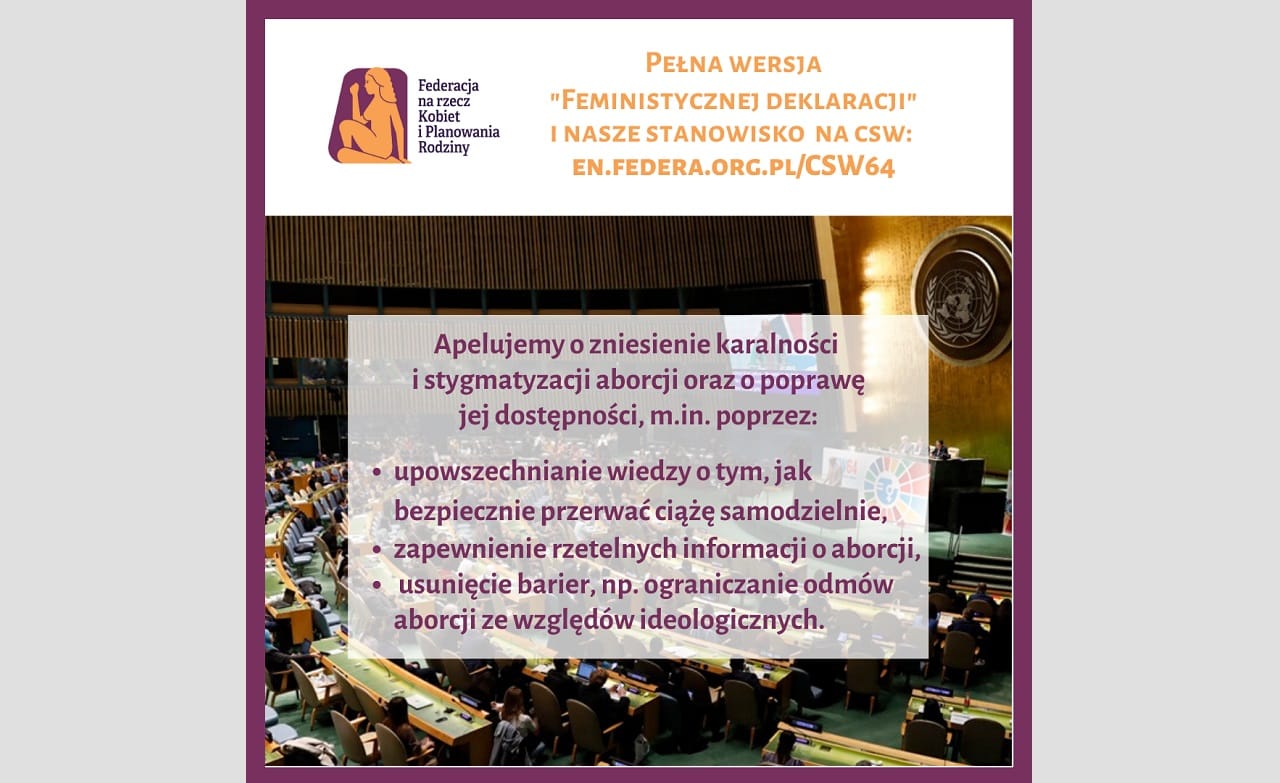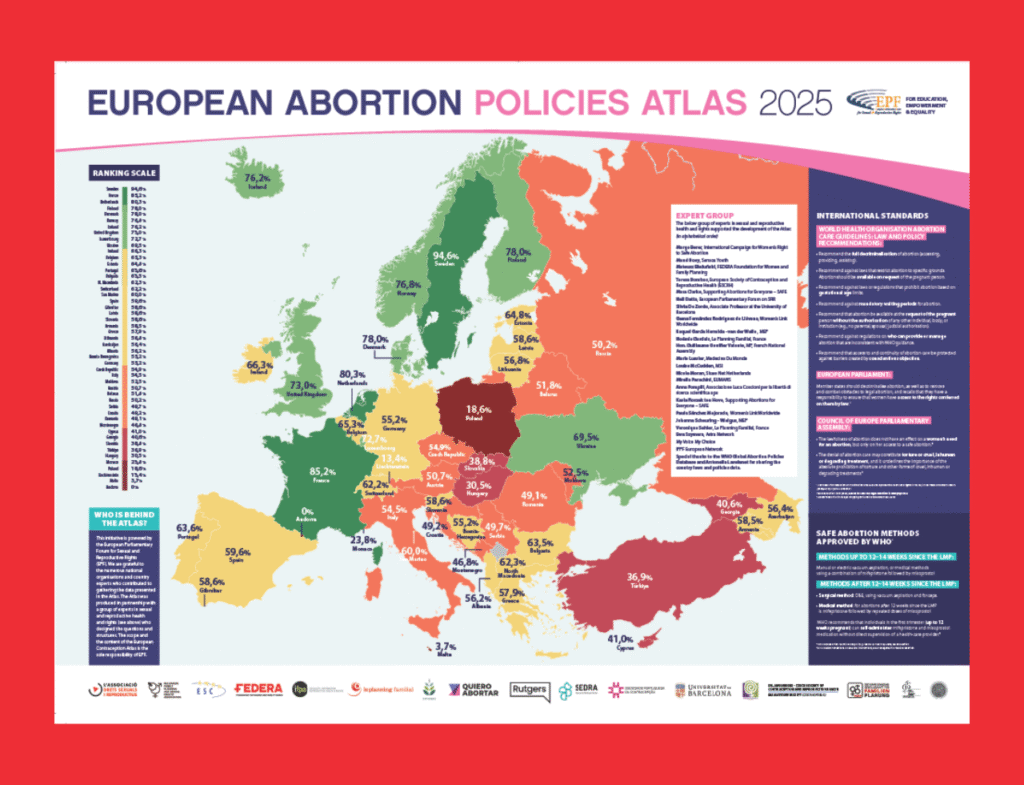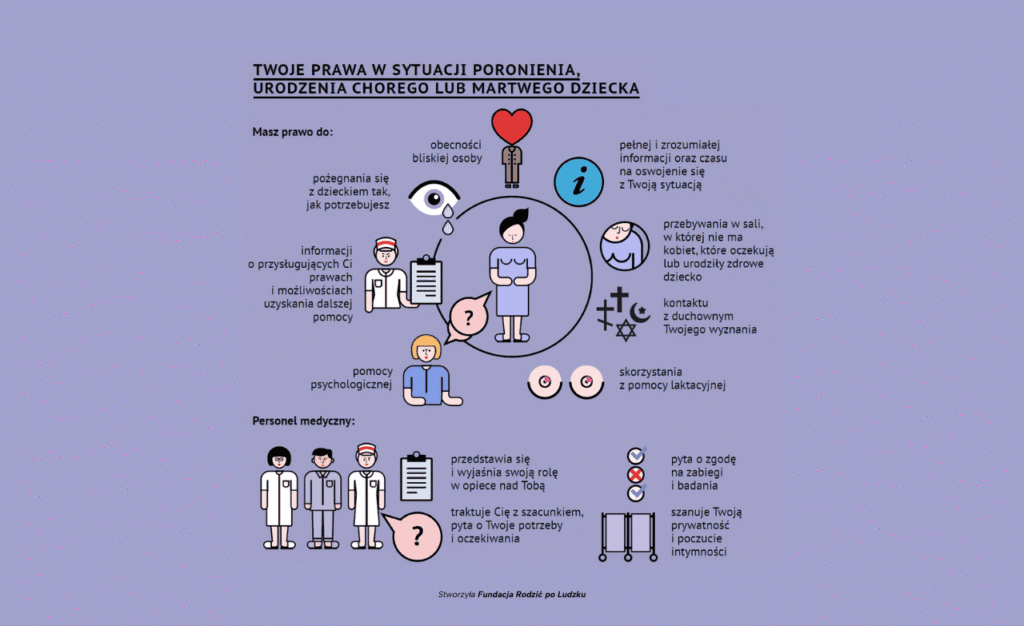Minęło 25 lat od przyjęcia przełomowej deklaracji na rzecz praw kobiet – Platformy Pekińskiej. Jak wywiązały się państwa z wdrożenia jej zaleceń? Jakie zobowiązania powinny podjąć, by realnie zwalczać dyskryminację i przemoc ze względu na płeć? Tymi pytaniami miała się zająć 64. sesja Komisji ds. Statusu Kobiet (CSW). Z powodu koronawirusa obrady zostały przełożone, a w nowojorskim ONZ państwa członkowskie wygłosiły jedynie deklarację polityczną w stylu „mamy dobre chęci, ale małe ambicje”.
Dlatego ponad 200 NGO-sów przyjęło kompleksową, inkluzywną, superprogresywną Feministyczną Deklarację, która wskazuje na szereg pilnych działań od zdrowia reprodukcyjnego – aborcja, antykoncepcja, badania profilaktyczne przez sytuację kobiet w obliczu wojen i katastrofy klimatycznej po zwalczanie przemocy i dyskryminacji krzyżowej.
Co ważne, deklaracja wymienia także postęp, który nastąpił w obszarze praw kobiet od 1995, m.in. to, że aż w 50 państwach dostęp do aborcji stał się łatwiejszy. Na marginesie, Polska nawet nie raczyła sprawozdać się z realizacji Platformy Pekińskiej. Jako jedno z dwóch państw na świecie!
Stanowisko Federacji na rzecz Kobiet i Planowania Rodziny, Union Women’s Center, “Women and Modern World” Social Charitable Centre oraz Women’s Rights Center
The Federation for Women and Family Planning from Poland, Union Women’s Center from Georgia, “Women and Modern World” Social Charitable Center, and Women’s Rights Center from Armenia are organizations accredited by the United Nations Economic and Social Council that are working in the field of women’s rights in Central and Eastern Europe and the Caucasus, and operate on national, regional, and international levels throughout the ASTRA Network membership.
We welcome this opportunity to reflect about the best ways the international community can address critical structural and systemic obstacles to realizing gender justice and women’s human rights, including sexual and reproductive rights. After 25 years since the drafting of the Beijing Declaration and Platform for Action, we also are ready to celebrate the gains we have made in countering the oppressive systems and advancing women’s rights and to discuss how it can contribute towards the full realization of the 2030 Agenda for Sustainable Development. In many countries, we also have witnessed backlash against those gains and consolidation of power structures underlying women’s oppression. Feminists need to continue building fully inclusive movements and take collective action to forge solidarity with other resistance and liberation movements, demanding the accountability of states and the private sector.
Beijing+25 is an agenda for women’s empowerment. The World Conference on Human Rights reaffirmed clearly that the human rights of women throughout the life cycle are an inalienable, integral, and indivisible part of universal human rights. Twenty-five years ago, the Fourth World Conference on Women aimed at empowerment of women and girls on all levels and reaffirmed that the right of all women to control all aspects of their health, in particular their own fertility, is basic to their empowerment. The Beijing Declaration and Platform for Action recognized that reproductive rights rest on the recognition of the basic right of all couples and individuals to decide freely and responsibly the number, spacing, and timing of their children and to have the information and means to do so, as well as the right to attain the highest standard of sexual and reproductive health. The decisions concerning reproduction shall be free of discrimination, coercion, and violence, as expressed in human rights documents.
We will focus this statement on priorities stemming from our work in the field of sexual and reproductive health and rights in the Central and Eastern European region. At the same time, we are fully aware about the need to see the sexual and reproductive health and rights from the fully intersectional perspective, with the necessity to address all the social and material determinants of life and health, including poverty and inequality that affects women and systems that fossilize them. The narratives of all women and girls, as well as transgender and non-binary persons, should be taken into account, with a special attention on disabled and migrant women, girls, and members of the lesbian, gay, bisexual, transgender/transsexual, queer or questioning, intersex, and other sexual identities community.
The very serious backlash is observed in the sphere of women’s access to health, which constitutes the basic component of the women’s reproductive health. Unsafe abortions threaten the lives of a large number of women, representing a grave public health problem, as it is primarily the poorest and youngest who take the highest risk. Most of these deaths, health problems, and injuries are preventable through improved access to adequate health-care services. This include safe and effective family planning methods and emergency obstetric care, recognizing the right of women, men, and other persons to be informed and to have access to safe, effective, affordable, and acceptable methods of family planning of their choice, and other methods of their choice for regulation of fertility that are not against the law. It also includes the right of access to appropriate health-care services. This law is being repeatedly violated in several countries of the region, with Poland being an inglorious leader of countries with the worst access to contraception in all of Europe – as the only European country that requires a prescription to acquire emergency contraception. To fulfil women’s and girls’ access to the full spectrum of reproductive health services, States should revoke laws and policy frameworks that criminalize and penalize bodies, sexualities, and identities – including, above all, criminalization and stigmatization of abortion. Poland, Georgia, and Croatia can be listed as examples of countries struggling to provide sufficient access to safe abortion to all their inhabitants, with one of the main reasons of such a situation being the aforementioned stigmatization. The so-called “conscientious objection clause” is also identified as a particularly important phenomenon, responsible for a dramatic drop in quality of reproductive care in the whole region of Central and Eastern Europe. Usage of the clause was reported by several local non-governmental organizations and remains one of the biggest obstacles in accessing modern contraception and other family planning services.
Alongside other impediments, the rise of populism in the region of Central and Eastern Europe is to blame for worsening of women’s and girls’ situation. The Hungarian government can serve as example, with its narrative that it is a woman’s duty to give birth in order to save European culture from the refugee crisis. Continuous attempts to control reproductive health and rights have an inexpressible impact on the actual access to basic medical and educational services that are to be guaranteed by both local and international laws.
In many countries of the region, the right to comprehensive sexuality education is not fully realized or even not realized at all, as it is in Russia. There are legal, regulatory, and social barriers to sexual and reproductive health education within formal education programmes regarding women’s and girls’ health issues. The new barriers are introduced, for example in Poland, in which the smear campaign against the sexuality education and members of the lesbian, gay, bisexual, transgender/transsexual, queer or questioning, intersex, and other sexual identities community is fuelled by the government for denigrating sexuality education and scaring off parents from signing up their children for sexuality education classes. The Polish ruling party has also supported the proposed novelization of the national penal code that would criminalize sexuality education. In this regard, the role and responsibility of adolescent girls in sexual and reproductive health and behaviour should be emphasized. Girls should have access to appropriate services/counselling and information, regarding the physiology of reproduction, reproductive, and sexual health, as agreed to in the Programme of Action of the International Conference on Population and Development, responsible family planning practice, family life, reproductive health, sexually transmitted diseases, HIV infection, and AIDS prevention, recognizing the parental roles.
Violence against women is an obstacle to the achievement of the objectives of equality, development, and peace. Violence against women both violates and impairs, or nullifies, the enjoyment by women of their human rights and fundamental freedoms. The long-standing failure to protect and promote those rights and freedoms in the case of violence against women is a matter of concern to all States and should be addressed. As regards women and economy, employers rely on discriminatory practices on the basis of women’s reproductive roles and functions, including refusal of employment and dismissal of women due to pregnancy and breast-feeding responsibilities. This shall also be addressed by the States.
Therefore, 2020 will be a pivotal year for the accelerated realization of gender equality and the empowerment of all women and girls everywhere. Given the global crisis in the world and the evident backlash on women’s rights in many countries, the States should recommit even stronger to the full implementation of actions decided 25 years ago at the Fourth World Conference on Women in Beijing.




